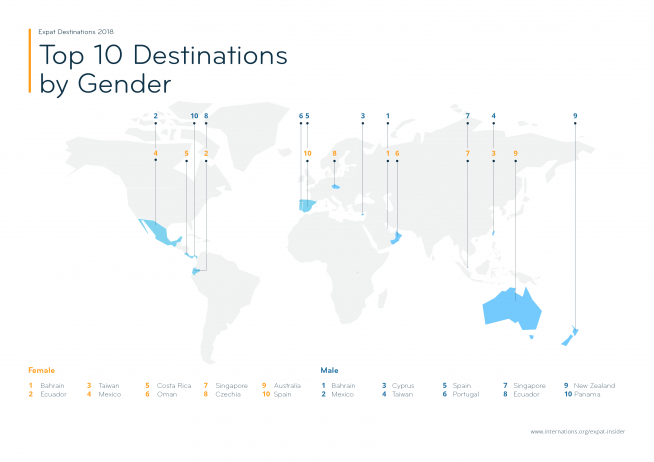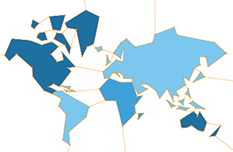The Best & Worst Places for Men and Women
- Bahrain is the best expat destination regardless of gender.
- Taiwan and Mexico are in the top 5 for both men and women.
- While Cyprus places 3rd for men, it only ranks 29th for women.
- Other countries with major differences include Oman, Finland, Romania, and Indonesia.
For a destination to be counted in a gender-specific ranking, it needed at least 31 respondents for that gender. A total of 67 countries rank for women, and the men’s ranking also features 67 destinations.
Best Destinations: Men and Women Mostly Agree
While men and women might not always agree, expats of either gender are enamored with Bahrain: the Gulf State does not only rank first in the entire survey, but also in both gender-specific rankings. Among male respondents, Mexico makes it to second place, while it narrowly misses the top 3 in the overall and the women’s ranking, placing fourth in both. Similarly, Taiwan — in second place overall — is regarded favorably by both genders: it ranks third among female respondents and fourth among men. For more details on the best and worst countries for expats in general, please refer to the respective article.
Cyprus, on the other hand, is more of an exception: while it ranks 3rd out of 67 countries for male expats, it only makes it into the women’s top 30, ranking 29th. It is actually among the five countries with the biggest differences according to gender, which are covered in detail below.
Little Variation at the Bottom
While Bahrain is everyone’s darling, male and female respondents alike are unhappy with expat life in other Gulf States: Kuwait ranks last in every list (i.e. among both genders as well as overall). Saudi Arabia doesn’t do much better, placing second to last in both the general and the men’s ranking; among women, it comes in 65th place out of 67 destinations.
Opinions on Russia and India are more divided. The former places second to last for women but 44th out of 67 countries for men: female respondents rate Russia worse than their male counterparts in nearly all subcategories, often significantly so. The country might not have been the destination of choice for quite a few women, either: with 28%, they are much more likely to move to Russia for their partner’s career than men (1%).
India, however, is rated far more positively by women (52nd vs. 65th among men) — they are, for example, more likely to say they are happy with their life in general (77% vs. 67% of men). Moreover, men and women report vastly different reasons for relocating to India: while over two-fifths of men (41%) were sent there by their employer, 46% of women moved for their relationship — either for their partner’s career (20%) or to join their partner in the latter’s home country (20%).
Oman: Popular with Expat Wives
With a difference of 47 ranks, opinions on life in Oman could hardly be more different. According to female expats, it is a country worthy of the top 10, coming in 6th place out of 67; however, men rank it much worse at 53rd, with satisfaction levels varying widely across all indices.
Life in Oman is very comfortable: people are very nice, and you have a lot of leisure time.
Women rate Oman particularly well for ease of settling in (5th), personal finance (11th), and, to a lesser degree, quality of life (27th). One woman from Nepal, for example, considers “life in Oman very comfortable: people are very nice, and you have a lot of leisure time”. Men are noticeably less satisfied, ranking Oman 25th, 41st, and 52nd, respectively, in these indices. No female respondent in Oman is unhappy with her life in general, while 15% of men voice their dissatisfaction. A look at the reasons for relocating might explain at least some of these differences: most male expats in Oman (54%) cite work-related reasons as the main motivation for the move; just 28% of women say the same. Instead, they are much more likely to have moved to Oman for their partner’s career, with 31% giving this reason.
Finland: Women Still Searching for Jobs
Men and women in this Nordic country mostly agree on its high quality of life (ranked 8th by men and 16th by women) as well as the less favorable personal finances (57th by men and 63rd by women).
However, opinions are sharply divided when it comes to the ease of settling in (with Finland placing 48th among men vs. 61st among women) and, most noticeably, regarding working abroad. Finland ranks 9th for the latter among men, while it doesn’t even make the upper half according to expat women (47th out of 67). Close to half the female respondents (46%), for example, rate their local career prospects negatively, compared to 28% of female survey participants worldwide. “It is hard to get a job with no experience in the local labor market,” according to an expat woman from Bulgaria.
It is hard to get a job with no experience in the Finnish labor market.
Again, a look at demographics and the respondents’ reason for relocating might shed some light on these differences. Moving to Finland to live in their partner’s home country is the most important reason among both men (40%) and women (34%). However, the comparatively younger women (an average age of 36.2 years vs. 40.6 years among men) struggle much more when it comes to settling in professionally: one in four is still looking for a job, which is the case for just 7% of the men.
Romania: Where Men Want to Live Forever
There is a noticeable difference in how men and women perceive expat life in Romania: it ranks 26th among the former, but only 56th among the latter.
Opinions vary across all indices, except for cost of living (16th among women, 15th among men), but female respondents are particularly dissatisfied with personal finance. They are twice as likely to say that their disposable household income is not enough to cover daily costs (35% vs. 17%), and 12% are not satisfied with their financial situation at all, compared to 2% of men in Romania. Information on annual household incomes supports these results: while less than a quarter of female respondents (22%) have more than 50,000 USD a year at their disposal, two in five men say the same.
Women are also less satisfied with the ease of settling in (38th vs. 18th), the quality of life (51st vs. 36th), and working in Romania (59th vs. 47th). Interestingly, a larger share of women have acquired Romanian citizenship (16% vs. 10% of men), though men are more likely to plan on staying forever (38% vs. 21% of women).
The latter result might be related to men’s higher average age (43.3 vs. 35.4 years) as well as their reason for relocating: 24% of male respondents in Romania moved to join their partner in their home country. Women, however, are more likely to go to Romania for their partner’s career or their own education (16% each).
Cyprus: Not a Paradise for Working Women
The Mediterranean island places 3rd out of 67 countries for male expats. Women are less happy, ranking Cyprus only 29th. Regardless of gender, Cyprus does well for ease of settling in (12th out of 68), and opinions differ only slightly between women (13th) and men (3rd) here.
Jobs are terrible in Cyprus, and the income and hours are awful.
There is, however, an extreme discrepancy regarding personal finance: 38% of expat women in Cyprus say their disposable household income is not enough to cover costs. Among the men, about one in twelve (8%) say the same. Men in Cyprus are three times as likely to have an annual household income of over 150,000 USD (9% vs. 3%), and 82% are generally satisfied with their financial situation (vs. 64% of women). One female respondent from the UK points out that “jobs are terrible, and the income and hours are awful”.
It is not only their finances that women are dissatisfied with: they rank Cyprus 55th in the Working Abroad Index, with 38% rating their job security negatively. Men are much more satisfied with their working life overall (38th), and just 16% judge job security unfavorably.
Luckily, work no longer plays a major role for a large share of respondents in Cyprus: 30% of women and 46% of men are actually retirees. This also explains the higher-than-average ages: women in Cyprus are 3.7 years older than the survey average (47.9 vs. 44.2 worldwide), and, at 53.8 years, men are nearly a decade older.
Indonesia: Unhappy Male Managers
Work and finance are also responsible for some major differences in opinion between male and female expats in Indonesia. While women rank the country 10th out of 67 in the Personal Finance Index, it only lands in 30th place for men: 76% of women are generally satisfied with their financial situation, but just 67% of male respondents say the same.
Women in Indonesia are less likely to be unhappy with their life in general (7% vs. 14% of men) and more likely to have a favorable view of their work-life balance: they rank Indonesia 16th in the Work & Leisure subcategory, while it places 40th for men.
In Indonesia, there are more opportunities to work for educated trailing spouses.
The latter result might be connected to the respondents’ reason for moving: while 23% of male expats in Indonesia were sent by their employer, nearly the same share of women (22%) moved abroad for their partner’s career. “There are more opportunities to work for educated trailing spouses,” according to an Indian expat woman. Women with a full-time job spend over nine hours a week less at their job than men (40.9 vs. 50.1 h/week), with 30% of the latter working in management positions.




